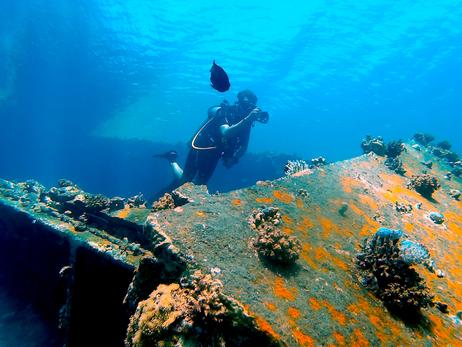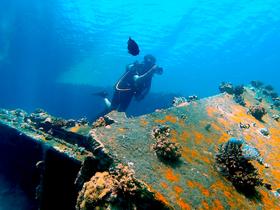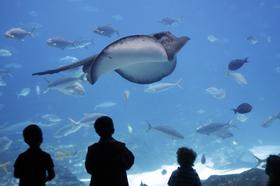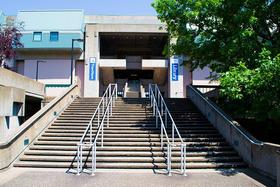If you love the ocean and are fascinated with the creatures that live within its depths, a career in marine biology might be the right choice for you. While this career has traditionally required a minimum of a four-year degree to get your foot in the door, many community colleges are now offering marine biology programs - in addition to aquarium science ones - that allow students to land jobs as research assistants and other entry-level positions in much less time. This article will cover what the career of a marine biologist looks like and highlight some of the community college programs now available in this field of study.
What is Marine Biology?
According to the Bureau of Labor Statistics, marine biologists commit their careers to studying saltwater organisms, focusing on the molecular biology of the living cells in creatures living within saltwater bodies around the world. Marine biologists may also be referred to as oceanographers, scientists who study the physical characteristics of the ocean, as well as the ocean floor. The work of a marine biologist is typically done in the field or a laboratory rather than in an office setting.
Marine biologists usually have a minimum of a four-year degree in the biological sciences, and many pursue post-graduate work as well. However, thanks to the addition of marine biology programs at community colleges, students can now find entry-level work in marine biology in a much shorter period of time, gaining on-the-job training as they pursue additional education or work their way up through the ranks of their initial position. The BLS predicts that jobs for biological scientists of all kinds will increase at a rate faster than the national average over the next few years.
As this video illustrates, the Marine Biology Program at Hillsdale College is a concentrated field study that introduces students to the ecology of shallow, subtropical marine environments.
Studying Marine Biology in Maine
The Applied Marine Biology and Oceanography program at Southern Maine Community College prepares students for a career as a research assistant or technician in the aquatic field. The curriculum encompasses hands-on laboratory and field work, offering students a broad range of training in their chosen field of study. Students that enroll in the program begin with general science courses that include biology and chemistry and then move into more specialized areas of study, such as fishery science, ecology, and oceanography. Specific attention is given to identifying a diverse range of marine organisms and performing oceanographic samplings onboard the school's own research vessel.
The college website also states that many students who graduate from this program move directly into employment with public and private marine biology laboratories. Others land positions in state and federal marine resource agencies or environmental protection agencies. The associate in science degree can also be the first step to additional education and training in the field of marine biology.
Programs Available in the Florida Keys
For students who prefer to study marine life in the country's southern end, Florida Keys Community College is another option for a degree in underwater science. The school was recently awarded acceptance into the American Academy of Underwater Sciences, which is the sanctioning body for underwater scientific research divers, according to a report at KeysNet.com. Now, students attending the program will be eligible for the certification to pursue careers as underwater scientists.
Patrick Rice, dean of the diving school, told KeysNet.com, "For research diving, we're under the AAUS. We don't really have to change any of our curricula. In our application to the AAUS, we took two of the courses we were currently teaching [research and rescue diving] because we believed they covered the curriculum a scientific diver should know." The school hopes the first student will gain certification in scientific diving by this summer. Rice added that potential employers for those with certification include the National Oceanic and Atmospheric Association and Mote Marine Laboratory.
As this video describes, California State University Long Beach is one of only a handful of schools that offer a Bachelor of Science degree in Marine Biology; many other schools offer a marine biology specialization or option with their biological sciences degree.
Marine Biology Studies in California
Another coastal state offering opportunity in marine biology at the community college level is California. Orange Coast College provides courses through its Marine Science Department in oceanography, marine biology, marine mammalogy, and marine aquarium science, as well as other subjects of interest. The school offers an associate of arts degree in biology with an emphasis on marine studies and boasts its own "wet" marine laboratory for student coursework. The laboratory includes 2500 gallons of re-circulating cooled water and warm water tropical tanks. The school also maintains a sea base in Newport Harbor, not far from the college campus.
Students in the program can learn firsthand whether a career in marine biology is right for them through hands-on training, collecting samples of the ocean floor, interpreting oceanic weather information, and exploring the fundamentals of marine navigation. This large teaching program is the perfect way for students to launch a rewarding study into the world of marine biology and determine if this is the right career path for them. Once students earn their associate degree in biology, they can choose to enter the baccalaureate program in marine biology or oceanography at several different California universities.
Marine biology is an exciting field with a broad range of employment opportunities at locations around the country. With the introduction of associate degree programs at numerous community colleges along the coast, students interested in this field can complete their training and move directly into entry-level positions much more quickly than ever before. If marine biology is the right field for you, check with community colleges in your area to find out if they have degree programs.
Questions? Contact us on Facebook @communitycollegereview.















